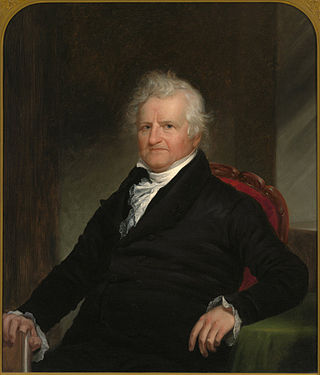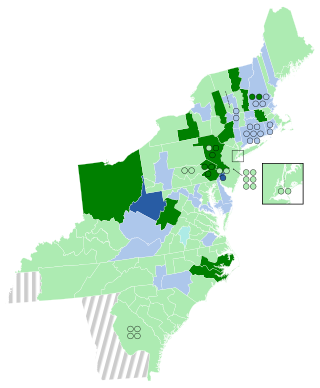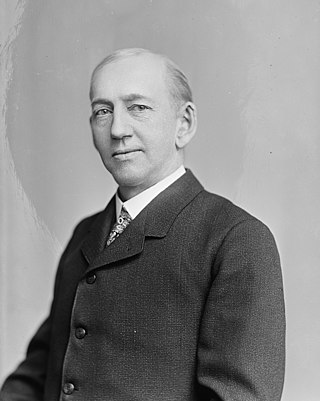
The Kennedy family is an American political family that has long been prominent in American politics, public service, entertainment, and business. In 1884, 35 years after the family's arrival from County Wexford, Ireland, Patrick Joseph "P. J." Kennedy became the first Kennedy elected to public office, serving in the Massachusetts state legislature until 1895. At least one Kennedy family member served in federal elective office from 1947, when P. J. Kennedy's grandson John F. Kennedy became a member of Congress from Massachusetts, until 2011, when Patrick J. Kennedy II retired as a member of the U.S. House of Representatives from Rhode Island.

Joseph Bradley Varnum was an American politician from Massachusetts. He served as a U.S. representative and United States senator, and held leadership positions in both bodies. He was a member of the Democratic-Republican Party.

Massachusetts's 1st congressional district is a United States congressional district located in the western and central part of Massachusetts. The state's largest congressional district in area, it covers about one-third of the state and is more rural than the rest. It has the state's highest point, Mount Greylock; the district includes the cities of Springfield, West Springfield, Pittsfield, Holyoke, Agawam, Chicopee and Westfield.
The 1820–21 United States House of Representatives elections were held on various dates in various states between July 3, 1820 and August 10, 1821. Each state set its own date for its elections to the House of Representatives before the first session of the 17th United States Congress convened on December 3, 1821. They coincided with President James Monroe winning reelection unopposed.
The 1818–19 United States House of Representatives elections were held on various dates in various states between April 26, 1818 and August 12, 1819. Each state set its own date for its elections to the House of Representatives before the first session of the 16th United States Congress convened on December 6, 1819. They occurred during President James Monroe's first term. Also, newly admitted Alabama elected its first representatives in September 1819, increasing the size of the House to 186 seats.

The 1810–11 United States House of Representatives elections were held on various dates in various states between April 24, 1810 and August 2, 1811. Each state set its own date for its elections to the House of Representatives before the first session of the 12th United States Congress convened on November 4, 1811. They occurred during President James Madison's first term. Elections were held for all 142 seats, representing 17 states.

Massachusetts's 11th congressional district is an obsolete district that was active during three periods: 1795–1843, 1853–1863, and 1873–1993. The district was located in several different areas of the state. It was most recently eliminated in 1993 after the 1990 U.S. census. Its last congressman was Brian J. Donnelly.
Shearjashub Bourne was an American lawyer, jurist, and politician from Massachusetts who served in the Massachusetts House of Representatives and United States House of Representatives.

Frederick William Dallinger was a United States representative from Massachusetts and a judge of the United States Customs Court.

Thomas Joseph Lane was a U.S. Representative from Massachusetts from 1941 to 1963, notable for having been re-elected after serving time in federal prison.
Artemas Ward Jr., like his father, Artemas Ward, was a United States representative from Massachusetts. He served in the Thirteenth Congress and Fourteenth Congress (1813–1817). He was a member of the Federalist Party.

Massachusetts's 12th congressional district is an obsolete district that was first active 1795–1803 in the District of Maine and 1803–1843 in Eastern Massachusetts. It was later active 1883–1893 in Western Massachusetts and 1893–1983 in Eastern Massachusetts. It was most recently eliminated as a result of the redistricting cycle after the 1980 Census. Its last Congressman was Gerry Studds, who was redistricted into the 10th district.
Phanuel Bishop was a United States representative from Massachusetts. Born in Rehoboth in the Province of Massachusetts Bay, he attended the common schools, was an innkeeper, and served in the Massachusetts State Senate from 1787 to 1791. He was a member of the Massachusetts House of Representatives in 1792, 1793, 1797, and 1798, and was elected as a Democratic-Republican to the Sixth through Ninth Congresses, serving from March 4, 1799 to March 3, 1807. He was one of six Democratic-Republican representatives to vote against the Twelfth Amendment to the United States Constitution. He died in Rehoboth, Mass; interment was in Old Cemetery, Rumford, Rhode Island.
Artemas Hale was a U.S. Representative from Massachusetts.

Charles Quincy Tirrell was a lawyer, educator, and U.S. Representative from Massachusetts.

Michael Francis Phelan was a U.S. Representative from Massachusetts.

Selwyn Zadock Bowman was an American attorney and politician who served in several public offices including that of U.S. Representative from Massachusetts.

The 1836 United States presidential election in Massachusetts took place between November 3 and December 7, 1836, as part of the 1836 United States presidential election. Voters chose 14 representatives, or electors to the Electoral College, who voted for President and Vice President.
The Boston mayoral election of 1917 occurred on Tuesday, December 18, 1917. Andrew James Peters, Assistant Secretary of the Treasury, defeated incumbent Mayor of Boston James Michael Curley and two other candidates.












